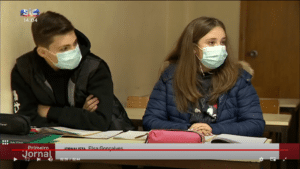Peer-reviewed studies point to masks actually making things worse…
To mask or not to mask: that is the question, even today – and it has actually been answered multiple times by scientific studies that shout ‘the latter’.
But still people are wearing masks. They get upset if they are told there is little point to them. There is even the understanding that they could be mandated again, in the autumn/ winter, if waves of Covid infections put new strain on the health service.
Today’s Council of Ministers stopped short of changing Portugal’s policy on mask-wearing – although the country’s ‘situation of alert’ has been extended to the end of June.
For the time being we are able to go mask-free in most situations – but the mixed messaging is ubiquitous: even politicians continue to wear masks – sometimes when they are outside in the open air. “You can never be too safe”, seems to be the message – which if one looks at a number of scientific studies would appear to be misguided.
Expresso today has carried a salutary article on the “business of masks”, and how just the Continente chain has managed to sell 38 fabric (‘made-in-Portugal’) masks per person through the pandemic.
Business is tailing off now, but in terms of exports, masks have made national companies tens of millions of euros. The disposable ones are still in demand (albeit not hot demand), which makes studies in which the efficacy of masks is unmasked all the more confusing. Why does no one discuss them? Why does no one seem to know about them?
The lack of reporting in the mainstream is the biggest mystery: how can people make their minds up (about what they are being told) without knowledge?
Thus here is a short list of some of the studies into advantages (or otherwise) of wearing masks. These are studies from sources that offer further information within their ‘references’ sections, but which have not been promoted in any meaningful way:
https://www.acpjournals.org/doi/10.7326/M20-6817
https://centerforneurologyandspine.com/do-masks-work-see-the-review-of-over-150-studies-below/
The bottom line is that mask-wearing does not in fact bring obvious positive results – and, as has been universally recognised, contributes to other problems, not least the inability for young children to learn/ develop vital communication skills.
A working paper prepared for the Cato Institute explains masks could also accelerate disease spread. “For example, the auditory difficulties engendered by masks combined with their obfuscation of lip movements could cause wearers to talk more loudly (which yields greater numbers of droplets), lean to the side of plastic barriers while speaking, or approach more closely to hear or be heard, undermining the reductions in droplet movement that masks provide. This concern is particularly relevant for the aged or others who have impaired hearing and who may also be at higher risk of severe COVID19 infection.”
There is a deep pool of independent scientific research more than two years on from the start of the pandemic, and this may well explain why, in spite of entreaties from various quarters in Portugal (including even the restaurant sector…), the government still balks at bringing back mask mandates.
natasha.donn@portugalresident.com




















